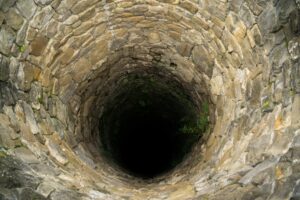Objectives:
- Honor your suffering. You are trapped by physical and mental sensations without an apparent way out.
- You feel extremely isolated but many people in this hole (The Abyss) are also suffering badly. You are not alone.
- Your rightful frustration (rage) fires up your symptoms even more.
- Systematically learning and using tools to calm your body, will allow you to heal.
The Depth of Your Suffering – Darkness
All of us seek safety – physically and mentally. When we don’t feel safe, our bodies switch to a flight or fight mode, and we feel stressed. Another descriptive word is “anxious”, which is simply the feeling generated when you sense danger. We yearn for safety and detest anxiety, and when we can’t resolve the problem causing us to feel uneasy, we feel trapped. The word for this more intense bodily response is anger. It is our last-ditch effort to regain control and feel safe. When we still can’t escape a real or perceived threat, our bodies break down with the outcome being chronic mental and physical diseases.
Anxiety and anger are not psychological constructs; they are your body’s warning signals, and they evolved to be intentionally unpleasant. They are the pain and are manifested in many ways. Even with physical symptoms, the cause is unclear. There are reasons. Chronic stress translates into threat physiology (how your body functions), which causes symptoms, illness, and disease. Unless you know how to effectively process stress, you are trapped.

Feeling trapped causes deep suffering, creates many problems. BTW, everyone suffers. There are degrees, and not having basic needs met such as safety, food, shelter, and companionship creates havoc with every aspect of your health and life. I do not want to dishonor this level of suffering. For example, the incidence of significant anxiety issues is 100% if your income level is less than 19,000/ year.1 This is 1994 data that translates in approximately $38,000 in 2024.
We are also trapped by being a species with language, abstract thinking, and awareness of the finite nature of life. We can’t escape death. In addition to our physical challenges to staying alive, we cannot escape our thoughts. We have no protection from mental pain and suppressing unpleasant thoughts inflames the brain even more. These translate into RUTs, (repetitive unpleasant thoughts). They are universal varying in severity and frequency. The range is:
- Occasional unwanted thoughts
- Repetitive thoughts
- RUTs
- Repetitive disruptive thoughts
- Invasive thoughts
“The Abyss”
One afternoon, I was listening to a patient attempting to describe the depth of her suffering and it hit me how deep and hopeless this hole is for most people. I realized that words were inadequate to encapsulate the degree of misery. Since no one seemed to have any answers, there was no apparent way out. The description that seemed to fit for this dark, bottomless pit was “The Abyss”.
A recent research paper documented that the effect of chronic pain on one’s life is similar te the impact of terminal cancer.2 You hadn’t anticipated the possibility of your life being consumed by pain. The paper showed that chronic pain was worse in that with cancer, you at least know the diagnosis and there is an endpoint, one way or the other. This statement might sound harsh in that suffering from terminal cancer is horrible, but ongoing pain (mental and physical) without knowing if there is an endpoint is even worse.
A stark example of how uncertainty can eat away at you is illustrated in Dr. Viktor Frankl’s book, Man’s Search for Meaning.3 He was an Austrian psychiatrist who was imprisoned in a concentration camp during WWII. He lost several close family members and experienced unspeakable horrors. As he describes his personal experience, it is difficult to imagine anyone enduring even a fraction of what he witnessed and endured. Yet, he points out that the worst part of it all was not knowing when it was going to end.
Life in The Abyss
In addition to other life stresses, patients are trapped by unpleasant mental and physical symptoms, illnesses,and diseases. You are also trapped by the medical system, which is not consistently showing you a way out. Over time, you become discouraged (despondent). My equation for it is:
The Abyss = Anxiety/Anger x Time
Why isn’t pain part of this equation? It is because anxiety is the pain. When you are stuck in a whirlpool of relentless anxiety and frustration, life goes dark.
How deep is this hole? Here is a short list of the suffering I have encountered both personally and witnessed in my patients.
Losses include:
- Independence
- Financial
- At the mercy of the disability system
- Capacity to enjoy good music, friends, fine food, and hobbies without the experience being marred by pain
- Peaceful family life
- Feeling good – there are over 30 symptoms created by a chronically activated nervous system. There are also many other mental and physical disease states. Your body breaks down.
- Integrity – people don’t believe you and often the harder you try to convince your friends, family, peers, employers, and health care providers, the less you are believed.
- Being labeled – malingerer, drug-seeker, lazy, not motivated, and difficult
- Unlimited physical activity
- Peace of mind – RUTs are relentless and may be the worst part of the ordeal.
- Hope – this may be the worst aspect of it all. Repeatedly having your hopes dashed induces a depression.
No Way Out
Consider the depth of “The Abyss.” Your soul is being pounded into the ground by a pile driver of anxiety/anger as you remain trapped in your body, riddled by mental and physical pain. Your life is being systematically destroyed, but in some cruel cosmic joke, you’re alive to bear witness – without hope. This dark place in your mind is unusually deep – bottomless. And no one is listening………

Recap
Allow yourself to comprehend the depth of your suffering and degree of damage your pain has inflicted on your life. Awareness is the first step in successfully reversing this downward spiral. Right now, you are at the bottom, except there is no bottom……
Chronic illnesses are complex and random treatments can’t and don’t work. It is necessary to break your unique situation into its component parts and systematically deal with them. There is a way out of this incredibly dark place, but you cannot go from the depths of suffering to better health with willpower and belief. As you methodically acquire knowledge and skills to deal with each aspect of your situation, you’ll be able calm and re-route your body to break free and heal.
Questions and considerations
- First, give yourself a break. You are suffering badly. Many treatments have failed, and you may even be worse. No one seems to be able to show you a way out or even offer hope. There is no reason to have positive feelings about any of this. Allow yourself to feel the depth of your suffering and frustration. Express it a piece of paper and immediately tear it up. A few people have difficulty processing the feelings released with this exercise, and if you feel uncomfortable, immediately stop.
- Consider what is important to you in life, but you can’t access or experience them. Write down two or three things you would like to experience. Not being in pain is not one of the choices. You’ll see why as the course unfolds and it is also a given. None of us want to be in pain.
- List three to five of your most intolerable symptoms. For many people, the relentless onslaught of unpleasant thoughts is the worst aspect of it all.
- Give yourself credit for staying on your feet long enough to keep trying. A willingness to learn and practice is the number one factor predicting success.
References:
- Kessler RC, McGonagle KA, Zhao S, et al. Lifetime and 12-month prevalence of dsm-iii-r psychiatric disorders in the united states: Results from the national comorbidity survey. Arch Gen Psychiatry. 1994; 51(1): 8-9.
- O’Connor AB. Neuropathic pain: quality-of-life impact, costs, and cost effectiveness of therapy. Pharmacoeconomics (2009); 27: 95- 112.
- Frankl, Viktor. Man’s Search for Meaning. Beacon Press, Boston, MA, 1959,1962,1984, 2006.
